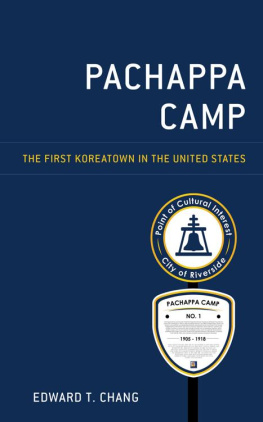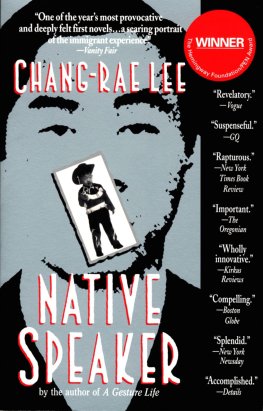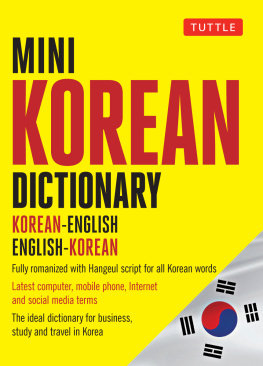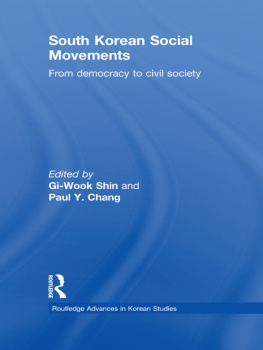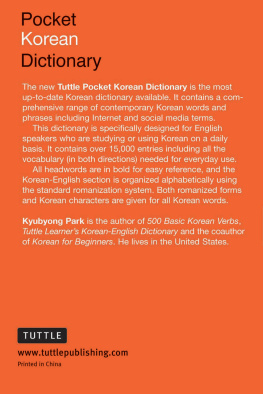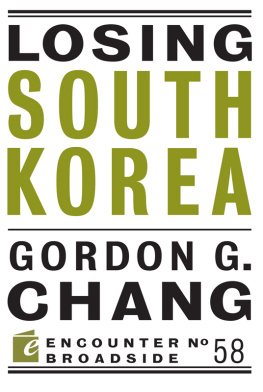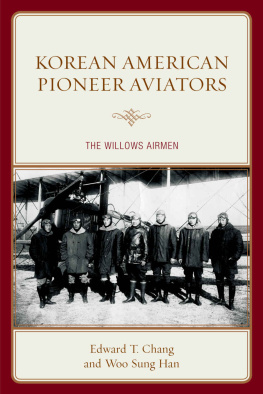Edward T. Chang - Pachappa Camp (Korean Communities across the World)
Here you can read online Edward T. Chang - Pachappa Camp (Korean Communities across the World) full text of the book (entire story) in english for free. Download pdf and epub, get meaning, cover and reviews about this ebook. year: 2021, publisher: Lexington Books, genre: Politics. Description of the work, (preface) as well as reviews are available. Best literature library LitArk.com created for fans of good reading and offers a wide selection of genres:
Romance novel
Science fiction
Adventure
Detective
Science
History
Home and family
Prose
Art
Politics
Computer
Non-fiction
Religion
Business
Children
Humor
Choose a favorite category and find really read worthwhile books. Enjoy immersion in the world of imagination, feel the emotions of the characters or learn something new for yourself, make an fascinating discovery.
- Book:Pachappa Camp (Korean Communities across the World)
- Author:
- Publisher:Lexington Books
- Genre:
- Year:2021
- Rating:5 / 5
- Favourites:Add to favourites
- Your mark:
- 100
- 1
- 2
- 3
- 4
- 5
Pachappa Camp (Korean Communities across the World): summary, description and annotation
We offer to read an annotation, description, summary or preface (depends on what the author of the book "Pachappa Camp (Korean Communities across the World)" wrote himself). If you haven't found the necessary information about the book — write in the comments, we will try to find it.
Pachappa Camp (Korean Communities across the World) — read online for free the complete book (whole text) full work
Below is the text of the book, divided by pages. System saving the place of the last page read, allows you to conveniently read the book "Pachappa Camp (Korean Communities across the World)" online for free, without having to search again every time where you left off. Put a bookmark, and you can go to the page where you finished reading at any time.
Font size:
Interval:
Bookmark:
Pachappa Camp
Series Editor
Joong-Hwan Oh, Hunter College, CUNY
Korean Communities across the World publishes works that address aspects of (a) the Korean American community, (b) Korean society, (c) the Korean communities in other foreign lands, or (d) transnational Korean communities. In the field of (a) the Korean American community, this series welcomes contributions involving concepts such as Americanization, pluralism, social mobility, migration/immigration, social networks, social institutions, social capital, racism/discrimination, settlement, identity, or politics, as well as a specific topic related to family/marriage, gender roles, generations, work, education, culture, citizenship, health, ethnic community, housing, ethnic identity, racial relations, social justice, social policy, and political views, among others. In the field of (b) Korean society, this series embraces scholarship on current issues such as gender roles, age/aging, low fertility, immigration, urbanization, gentrification, economic inequality, high youth unemployment, sexuality, democracy, political power, social injustice, the nations educational problems, social welfare, capitalism, consumerism, labor, health, housing, crime, environmental degradation, and the social life in the digital age and its impacts, among others. Contributors in the field of (c) Korean communities in other foreign lands are encouraged to submit works that expand our understanding about the formation, vicissitudes, and major issues of an ethnic Korean community outside of South Korea and the Unites States, such as cultural or linguistic retention, ethnic identity, assimilation, settlement patterns, citizenship, economic activities, family relations, social mobility, and racism/discrimination. Lastly, contributions relating to (d) transnational Korean communities may touch upon transnational connectivity in family, economy/finance, politics, culture, technology, social institutions, and people.
Pachappa Camp: The First Koreatown in the United States, by Edward T. Chang
Communicating Food in Korea, edited by Jaehyeon Jeong and Joong-Hwan Oh
Korean Digital Diaspora: Transnational Social Movements and Diaspora Identity, by Hojeong Lee Korean Food Television and the Korean Nation, by Jaehyeon Jeong
The 1.5 Generation Korean Diaspora: A Comparative Understanding of Identity, Transnationalism, and Culture, edited by Jane Yeonjae Lee and Minjin Kim Newcomers and Global Migration in Contemporary South Korea: Across National Boundaries, edited by Sung-Choon Park and Joong-Hwan Oh Health Disparities in Contemporary Korean Society: Issues and Subpopulations, edited by Sou Hyun Jang and Joong-Hwan Oh Koreatowns: Exploring the Economics, Politics, and Identities of Korean Spatial Formation, by Jinwon Kim, Soo Mee Kim, and Stephen Suh Korean International Students and the Making of Racialized Transnational Elites, by Sung-Choon Park Transnational Mobility and Identity in and out of Korea, edited by Yonson Ahn Korean Diaspora across the World: Homeland in History, Memory, Imagination, Media and Reality, edited by Eun-Jeong Han, Min Wha Han, and JongHwa Lee Mediatized Transient Migrants: Korean Visa-Status Migrants Transnational Everyday Lives and Media Use, by Claire Shinhea Lee LA Rising: Korean Relations with Blacks and Latinos after Civil Unrest, by Kyeyoung Park
The First Koreatown in the United States
Edward T. Chang
LEXINGTON BOOKS
Lanham Boulder New York London
Published by Lexington Books An imprint of The Rowman & Littlefield Publishing Group, Inc.
www.rowman.com
Copyright 2021 The Rowman & Littlefield Publishing Group, Inc.
All rights reserved. No part of this book may be reproduced in any form or by any electronic or mechanical means, including information storage and retrieval systems, without written permission from the publisher, except by a reviewer who may quote passages in a review.
British Library Cataloguing in Publication Information Available Library of Congress Cataloging-in-Publication Data Library of Congress Control Number: 2021932002
 The paper used in this publication meets the minimum requirements of American National Standard for Information SciencesPermanence of Paper for Printed Library Materials, ANSI/NISO Z39.48-1992.
The paper used in this publication meets the minimum requirements of American National Standard for Information SciencesPermanence of Paper for Printed Library Materials, ANSI/NISO Z39.48-1992.
This book is my twelfth publication and the most gratifying research project I have been involved with over the last thirty years. Several years ago, Korean American students at UC Riverside found a map published by the Sanborn Insurance Company of New York in 1908. The map of downtown Riverside near Pachappa Ave, included a caption Korean settlement. I had never heard of the existence of the Korean community in Riverside during the early twentieth century. It was widely known that Korean immigrants settled in Honolulu, Hawaii; San Francisco; or Los Angeles during the early twentieth century, but not in Riverside, California.
My journey began in 2016 and it was like trying to find a needle in a haystack. At the time, very little literature, writing, or research material on the Riverside Korean community was available. Sunju Lee wrote an article on Pachappa Camp, the Korean settlement in Riverside, but very few pieces of evidence were provided to support his claim. As I searched for any materials or information on the early Korean community in Riverside, I was delighted to find new information here and there. I felt inspiration and joy as I began to piece together the existence of the early Korean community in Riverside. In particular, the Korean language newspapers Sinhan Minbo and Gongnip Sinbo turned out to be jackpot sources as they provided rich information on the Korean community in Riverside during the early twentieth century.
Jia Yoon and Hyerin Joo, Korean literature Ph.D. students at Korea University, found and translated Sinhan Minbo and Gongnip Sinbo newspaper articles into modern Korean language. Without their translation of old Korean language to modern Korean language, I would not have been able to carry out and complete this research project without their help. They were god-sent angels who came to the Young Oak Kim (YOK) Center for Korean American Studies at UC Riverside as graduate student interns in 2018. I am greatly indebted to Jia Yoon and Hyerin Joo for their help on this research project.
Special appreciation is extended to supporters of the YOK Center: Dr. Mike Hong and late Lorrie Hong, Steve Ro, Yeung J. Kim, Jay Kim, Han Yeul Cha, Jang Young Jung Johnney Park, John Son, Peter Yoon, Jong Woon Lee, and Kae Hong Ko. They not only supported the YOK Center financially but also provided strong support and encouragement for this research project.
Acknowledgement is also warmly given to Milagros Pea and Sang Hee Lee, a former dean and assistant dean of the College of Humanities, Arts, and Social Sciences, UC Riverside, respectively, for their generous support of the Young Oak Kim Center. My research assistant, Hannah Brown, found many invaluable materials on the early Korean immigrant communities in Riverside and laid the foundation for this research project.
In particular, I would like to express my special appreciation and gratitude to Carol Park, who spent hours correcting early drafts and providing editorial suggestions to improve this manuscript.
Next pageFont size:
Interval:
Bookmark:
Similar books «Pachappa Camp (Korean Communities across the World)»
Look at similar books to Pachappa Camp (Korean Communities across the World). We have selected literature similar in name and meaning in the hope of providing readers with more options to find new, interesting, not yet read works.
Discussion, reviews of the book Pachappa Camp (Korean Communities across the World) and just readers' own opinions. Leave your comments, write what you think about the work, its meaning or the main characters. Specify what exactly you liked and what you didn't like, and why you think so.

